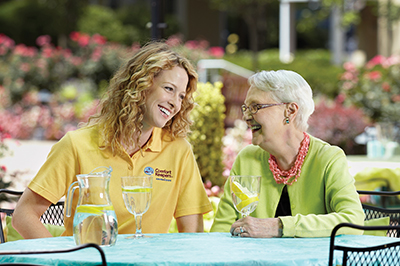Social Wellness in Seniors
As we age, it’s important to maintain physical well-being, but often times, psychological, emotional, and social health can fall by the wayside due to increased isolation.
The Importance of Fighting Isolation
As we age, it’s important to maintain physical well-being, but often times, psychological, emotional, and social health can fall by the wayside due to increased isolation. For some, this isolation can come about rather suddenly, with the passing of a loved one or close family members moving away. For others, it can be a more gradual process as the natural effects of aging begin to take hold.

Scientific and health communities have, for many years, viewed isolation as detrimental to the overall wellbeing of older adults. Studies continually suggest that those who are chronically isolated tend to have a higher frequency of health-related issues – while, conversely, socialization efforts can lead to healthier, more fulfilling lives. In fact, the Global Council on Brain Health (GCBH) – an international collaborative of AARP – recently released a report which includes a consensus statement indicating that social engagement helps “thinking skills and slows cognitive decline later in life.”
Other research studies suggest even more benefits of socialization, including:
- Strengthened immune system
- Reduced depression
- Increased productivity
Maintaining Social Wellness
As mentioned, there are several ways in which isolation can exist in the lives of older adults, and – depending on the situation – it may take some work to get back to a happier, healthier state of mind. If you have an aging loved one experiencing the effects of isolation, here are some ways that they can maintain positive wellbeing through socialization.
- Join a class or group – Whether it’s enrolling in a computer class or joining an exercise group at the local senior center, there are countless ways for older adults to be engaged in new activities or learnings. In addition to strengthening their cognitive abilities, these opportunities provide the chance to make new social connections with like-minded people. And because many of these activities are structured, there is a great amount of stability added to day-to-day routines for older adults. Religious organizations also offer a number of different opportunities for socialization, including retreats and community outreach events.
- Stay/become involved – Sometimes giving back to others is the best way to help maintain social wellness. Most towns have a wide array of organizations dedicated to providing assistance to those in need. This can be anything from giving music lessons or tutoring students. If your aging loved one has a skill or talent that can be utilized in the community, encourage him or her to reach out to their local civic and charity organizations. Giving back can even be as simple as volunteering at a soup kitchen once a month. These opportunities will certainly facilitate healthy socialization, while also providing a meaningful sense of accomplishment.
- Strengthen existing relationships – Throughout the course of a lifetime, it’s not uncommon for certain friends and family members to drift in and out of our “social circles.” We may be closer with one sibling, cousin, or neighbor over another – and as life begins to slow down for your aging loved one, those that have drifted away may be feeling the same feelings of isolation as your loved one. All it takes is one instance of reaching out in order to reconnect and catch up on old times. Social media platforms, like Facebook, have made this easier and more convenient than ever before. Your loved one can send instant messages and even share photos. The visual, interactive component of social media can make a world of difference, especially when face-to-face interaction is not possible or feasible
Comfort Keepers® Can Help
When your aging loved one needs companionship and socialization, he or she can count on Comfort Keepers®’ trusted caregivers. As part of our service offering, our caregivers can also provide everything from meal preparation to dependable transportation. Call your local Comfort Keepers’ office to learn even more about our services.
References:
Simple Most. “The 6 Health Benefits of Being Social” by Carina Wolff. Web. 2016.
AARP. “The Brain and Social Connectedness: GCBH Recommendations on Social Engagement and Brain Health.” Web. 2016.
Psychology Today. “The Health Benefits of Socializing” by Angela K. Troyer Ph.D., C.Psych. Web. 2017.
Everyday Health. “10 Easy Ways Seniors Can Boost Their Mental Health and Well-Being” by Diana Rodriguez. Web. 2016
Sign up to receive helpful info right to your inbox.
We understand choosing an in-home care provider can be a difficult decision, and we want to make your journey as easy as possible. We're here to support you by providing helpful senior care tips and information on in-home care and senior health and wellbeing topics.
Start a Job with a Purpose
Uplifting training and support for you every step of the way.
Apply to be a caregiver








